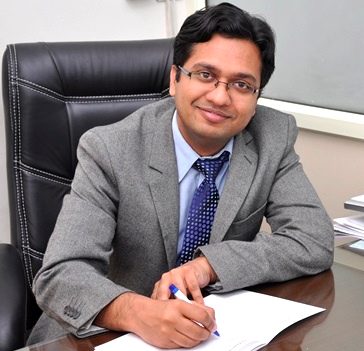


Dr. Rajiv Singla (MD DM, AIIMS) is a practicing Endocrinologist with vast experience in treating Diabetes, Thyroid, Obesity, (Polycystic Ovary Disorder)PCOD, Short Stature, Sexual Disorders and other Lifestyle disorders.
An alumnus of All India Institute of Medical Sciences (AIIMS) and Maulana Azad Medical College (MAMC, New Delhi), Dr. Rajiv Singla, currently heads the department of Endocrinology at Max Smart Super Speciality Hospital, Saket, New Delhi and Kalpavriksh Super Speciality Center, Dwarka, New Delhi.
Having over 14 years of experience in managing many critical and complex cases, Dr. Rajiv has been awarded a membership to The Endocrine Society (USA). He has contributed in many journals like Indian Journal of Endocrinology and Metabolism and has been invited to speak in conferences of Endocrinology Society of India.
At Center of Excellence for Endocrinology we provide care for hormone related problems like Diabetes, Thyroid, Obesity and other lifestyle related disorders. We aim to provide a wholistic solution which covers all the aspects of treatment and cure. Wholistic Solution encompassing consultation, treatment, diagnosis, medicines, diet, vaccinations and other facilities. All the records are created and maintained in digital format on a cloud based repository for the ease of doctor and patients.
Super Specialist OPD
Pathology Lab
Retinopathy
Diet
Podiatrist
Diabetes Foot Care
Diabetes Educator
Digital/Online Records
Vaccination
Medicine
Physiotherapy
Annual Health Packages
At Home Assistance
Thyroid diseases: i.e. Hypothyroidism, Hyperthyroidism, Goitre, Thyroid cancer and Thyroid eye disease
Diabetes Mellitus: Type 1, Type 2, Gestational etc
Hypoglycemia i.e. low blood glucose
Hypoglycemia
Metabolic Bone diseases like like osteomalacia (Vitamin D Deficiency), osteoporosis, Recurrent fractures, Hyperparathyroidism
Short Stature/Growth retardation in children
Obesity
Polycystic ovarian Disease
Pubertal Disorders like Precocious Puberty, Delayed puberty
Male Infertility
Cushing Syndrome
Gigantism (Tall stature), Acromegaly and other pituitary tumors
Hirsutism (excessive facial and body hairs)
Metabolic evaluation of Recurrent renal stones
Disorder of sexual differentiation
Youth onset hypertension
Lipid Disorders
Other Endocrine tumors like Pheochromocytoma, Neuroendocrine tumors
Gynecomastia (breast development in males)
Physical growth in children is result of concerted optimal functioning of hormonal, nutritional and psychosocial milieu. If a child is growing well physically in stature, it reassures us about endocrine and nutritional wellbeing. It is important that parents maintain health records of their children regularly and recording of height and weight is an integral and essential part of this.
How do I know if my child is shorter than normal?
This can be answered by comparing your child’s height to the height of other children who are the same age and sex. This comparison is done with help of standard charts which are available with your doctor. It is advisable to use Indian growth charts for our children. If your child is much shorter than other children of the same age and sex, doctors call it “short stature.”
Some children who are short do have a medical problem. Some of these include:
Very low body weight
Long-term diseases affecting the digestive system, heart, lungs, kidneys, or blood
“Growth hormone deficiency”. Growth hormone is a hormone made in the pituitary gland in brain that helps children grow normally. Children with this condition have too little growth hormone in their body to have normal physical growth.
Other hormonal diseases like thyroid problem, pituitary abnormality etc.
Problems that babies are born with, for example abnormal genes
Polycystic Ovary Syndrome is fast becoming the commonest hormonal disorder seen in medical practice. It is more common than diabetes and is almost as common as thyroid diseases in general population. These patients require special care as they are affected early and, if not properly guided early in course of disease, may lead to great psychological stress and anxiety. There are no absolute defining features for this syndrome and even underlying pathophysiology is not clear. This has led to lot of false beliefs/myths and these patients are generally subjected to overtreatment.
Myth: Any woman presenting with delayed menses and obesity is PCOS.
Truth: Diagnosis of PCOS is not that simple. At any age, diagnosis of PCOS is made only after exclusion of other diseases. These include diseases affecting other hormone producing glands like adrenals (congenital adrenal hyperplasia, Cushing syndrome), Thyroid and pituitary. Most important of these is congenital adrenal hyperplasia, which now contributes more than 12% of cases presenting with symptoms compatible with PCOS. It is pertinent to recognize and ascertain exact diagnosis in these patients as it carries great significance, especially related to outcome of future generations as this is generally inherited.
Myth: People with PCOS are obese because they do not exercise and eat junk food.
Truth: Commonly described equation, weight gain = calories consumed –calories spent, does not apply to people with PCOS. These people are somehow genetically wired to gain weight. They would have difficulty in even retaining same weight during periods of hormonal upheaval i.e. during puberty, pregnancy and even at menopause. These people need great understanding, encouragement and support from their physicians. Moreover, now more people with lean PCOS are also being diagnosed and they may, in-fact, have more severe disease.
Myth: Metformin would make people lose weight.
Truth: This is biggest hoax in PCOS. Metformin is not a weight-losing drug and neither has approval from any scientific community for this use. In our clinical practice, we do see people who lose some weight on metformin but that happens only in very small minority. This does not justify treating every PCOS woman with metformin.
Myth: PCOS can be cured with medications.
Truth: Medications are required to manage different manifestations of this disease. But, medications cannot cure PCOS. Only thing that can reverse or make things better in majority of patients is physical activity and weight loss. A healthy diet low in refined carbohydrates is important, as this can help regulate blood sugar levels. Exercise can also help the body regulate insulin and keep excess weight off. Losing weight is challenging with PCOS, but doing so can help reduce the male hormone levels in the body, and some women will begin to ovulate naturally.
Myth: Doing crash diet would lead to meaningful weight loss
Truth: Actually, we need to realize that lifestyle modification is required for lifetime in PCOS. Doing crash might help in short term, but physical activity in combination with a practical and pragmatic diet plan is vital for success in long term.
So, how do we suspect PCOS? If you have , especially with family background of diabetes, two or more of the following symptoms, you need to have a thorough checkup to determine if you need PCOS treatment:
Irregular or missing menstrual periods
Infertility
Excess or unwanted body or facial hair growth
Thinning hair on the scalp
Weight problems, often including weight gain around the waist
Skin problems, including skin tags, darkening skin and acne
With a proper diagnosis, lifestyle changes and PCOS treatment, women can get relief from this condition and the overwhelming health problems it can cause.